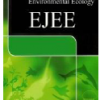Volume 10, Issue 1, 2023

Mcmed International
European Journal of Environmental Ecology
Issn
XXX-XXXX (Print),
2393 - 9672 (Online)
Frequency
bi-annual
Email
editorejee@mcmed.us
Journal Home page
http://mcmed.us/about/ejee
Recommend to
Purchase












